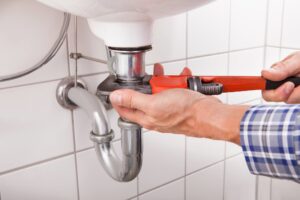 Functional and efficient plumbing pipes are critical to ensure a smooth water supply in your home. Therefore, you cannot afford to have the pipes malfunction even for a day. The best way to prevent issues is to understand telltale signs of failing pipes.
Functional and efficient plumbing pipes are critical to ensure a smooth water supply in your home. Therefore, you cannot afford to have the pipes malfunction even for a day. The best way to prevent issues is to understand telltale signs of failing pipes.
While failing pipes may manifest in different forms, one of the most common is noisy pipes. Noisy plumbing pipes can be quite annoying and disruptive, but luckily there are steps you can take to identify the issue and address it quickly. Discover the causes of noisy pipes and how to resolve them.
High Water Pressure
High water pressure is one of the most common culprits behind noisy plumbing pipes. The reason is that when the water pressure is too high, that may cause increased vibration in the pipes. Consequently, you may notice humming or crashing sounds more noticeable when there is a sudden change in pressure.
To determine if the problem lies with high water pressure, check the pressure gauge on your main water valve. If the reading exceeds 80 psi, you will need to adjust it to reduce the pressure in your pipes. If you don’t have a pressure regulator, contact a plumber to install one.
Loose Pipes
When the insulators and straps that support your pipes become loose, the pipes may become noisy. You may hear a rattling, vibrating, or cranking sound when the pipes move, especially when you open your faucets and the water starts flowing.
This sound is most noticeable behind the walls, ceiling, or floor, so it may be challenging to locate the exact source. Call for a plumber to inspect and identify where the loose pipes are. After pinpointing the area, they will then tighten or replace the sections that have come loose.
Failing Hardware
The fill valve in the tank of your toilet can fail or become partially blocked by debris. There are several ways you can tell. One it that it makes high pitched whistling or screaming sound, another is that it can run continuously. It’s hard to tell when it runs constantly because the excess water runs down the siphon tube and into the bowl but it doesn’t cause the bowl to fill.
Enough water can be lost this way that you may receive a high water usage notice from your local municipality. One way to diagnose this problem is to put food coloring in the toilet tank and check back in a couple hours. If no one has used the toilet and the food coloring has made it into the bowl then you have a leak from either the flapper or the fill valve.
Water Hammer
Water hammer is a term used to describe the loud banging noise when the water pressure in your pipes suddenly changes. The issue is commonly caused by sudden stops and starts of appliances such as washing machines, dishwashers, toilets, and showers or when you shut several valves simultaneously.
Although water hammer is not always a call for concern, the issue can cause problems if it occurs frequently. Also, the problem may signify blocked air chambers, so you may need to contact a plumber for an inspection.
Clogged Pipes
Over time, dirt and debris may accumulate in your pipes and cause a clog. The buildup restricts the flow of water, and when something finally breaks the clog, you may hear a loud noise due to the sudden change in pressure.
Clogs cause gurgling sounds as the water passes past the sludge. You may also notice rattling or clinking sounds as the solid particles rub against the sides of your pipes. If this is the case, hire a plumber to inspect and clear the clogged pipes carefully.
Whichever the cause of noisy pipes is, address the issues promptly and appropriately to prevent further damage. Consult a reliable and trusted plumber to identify the cause of the noise and restore your plumbing system to optimal working conditions.
You can trust us at Spartan Plumbing and Services to provide professional plumbing services and deliver fast, efficient solutions to any noisy piping issue. We are fully certified and have the experience, skills, and know-how to handle any plumbing issue. Contact us today for a consultation.
